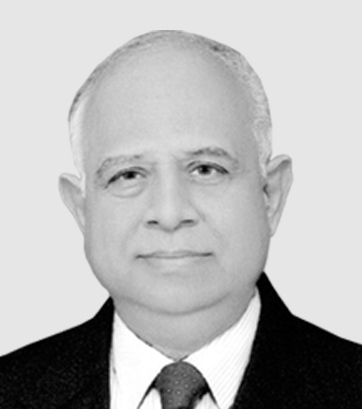“Revolving” political conscience
The corruption of the political process making democracy a farce is not new to Pakistan, or for that matter confined to Pakistan alone. Asif Zardari excels in it, as a “corruptor extraordinary” having mastered the art of buying and selling conscience. Despite his sordid reputation, he became President of the country and stayed in power through his term. While in prison he must have read Clausewitz whose first Principle of war (and politics) is “selection and maintenance of aim” concentrated on what in military language can be called the “vital person”.
His gathering of Pakistan Tehreek e Insaaf (PTI) dissidents did demonstrate his speciality of “revolving political conscience”, but it did set off alarm bells among those who still value honesty and integrity. Why do our soldiers continue sacrificing their lives in far off mountains and valleys; are we ready to accept their blood and sweat facilitating those with deep pockets continuing to enrich themselves and their future generations? What about the tears and misery of the families of Shaheeds and their future generations? In a country where freedom of expression is used as a licence to embellish and/or falsify facts, the Sindh House episode should have attracted adverse media attention, but it is no mystery that plenty of cash made “freedom of the press” gloss over the corralling of PTI horses for sale.
PTI MNAs violated party discipline apropos Article 63A when they admitted to breathless television anchors on numerous media channels that because of their “conscience” they would vote against Imran Khan in the “no-confidence” motion. The subsequent storming of the Sindh House by unruly PTI members to ferret them out was also certainly wrong, another sign of immaturity of political activism in Pakistan. In a perverse way this episode reinforces the dire need to drastically change, not reform, the political system in Pakistan.
Horse-trading has had a long tradition in Pakistan. To fight this, Article 63A was inserted into the Constitution several years ago to avoid “floor crossing”.
“Disqualification on grounds of defection, etc” quote:
(1) If a member of a Parliamentary Party composed of a single political party in a House,
(a) resigns from membership of his political party or joins another Parliamentary Party; or
(b) votes or abstains from voting in the House contrary to any direction issued by the Parliamentary Party to which he belongs, in relations to (i) election of the Prime Minister or the Chief Minister; or (ii) a vote of confidence or a vote of no-confidence; or (iii) a Money Bill or a Constitution (Amendment) Bill; he may be declared in writing by the Party Head to have defected from the political party, and the Head of the Parliamentary Party may forward a copy of the declaration to the Presiding Officer, and shall similarly forward a copy thereof to the member concerned. Provided that before making the declaration, the Party Head shall provide such member with an opportunity to show cause as to why such declaration may not be made against him.”
To interpret this constitutional article, one could not be confined to the letter of the legal injunction, but according to its spirit. Ideally the interpretation should suit both ways so that the spirit of the Amendment made to the Constitution has to be maintained.
Our judiciary has recently been literally interpreting the language of the law rather than its spirit. One was disappointed at the remarks in court during the Presidential Reference that suggested interpreting of 63A in such a way that first the violation of party discipline should take place and then (after the government is ousted) the members in violation can be punished. If we were to adopt this logic, it is as if we are waiting for the murder announced by the culprit to be committed before arresting him. This amounts to closing the gates after the “horses” have (literally) bolted.
Article 63A is meant to stop members of a party from violating party discipline, and violators must be suspended immediately once they have publicly disclosed their planned violation. Acting according to the constitution, Imran Khan must has therefore asked in writing to see the dissident PTI members, who have decided to defect from the PTI, to ascertain their intentions before the no-confidence vote. This is also an opportunity for them to voice their grievances – and even recant their decision. However, if they still want to go ahead with what their “conscience” has decided, the Head of the Parliamentary Party may forward a copy of the declaration to the Presiding Officer and shall similarly forward a copy thereof to the member concerned.
Hell-bent on toppling the government, the opposition is demanding an immediate vote on the “no-confidence” motion, but are we going to risk the throes of heading into a state of chaos as has happened in many countries in the last few decades? They even threatened the Organisation of Islamic Countries (OIC) Conference that was being hosted by Pakistan until saner heads prevailed, or were they made to see the light by those who matter? This attempt to sabotage the Pakistan Day Parade is just another pointer as to why our democracy is a farce where our political leaders display no sense of upholding the national interest.
While Imran Khan will stay on as PM, he must, however, heed the “lessons learnt” in the past few months. One lesson is that during the selection of his executive team, he must change Usman Buzdar, the disaster of a Chief Minister in the Punjab. He should be replaced with someone who has the interests of the country at heart and can be trusted to do the right thing.
Perhaps it is time that Chaudhry Nisar, who won his Provincial seat as an independent despite vehement opposition from his own party, comes in from the cold and becomes an effective Chief Minister of Punjab.
The writer is a security and defence analyst










